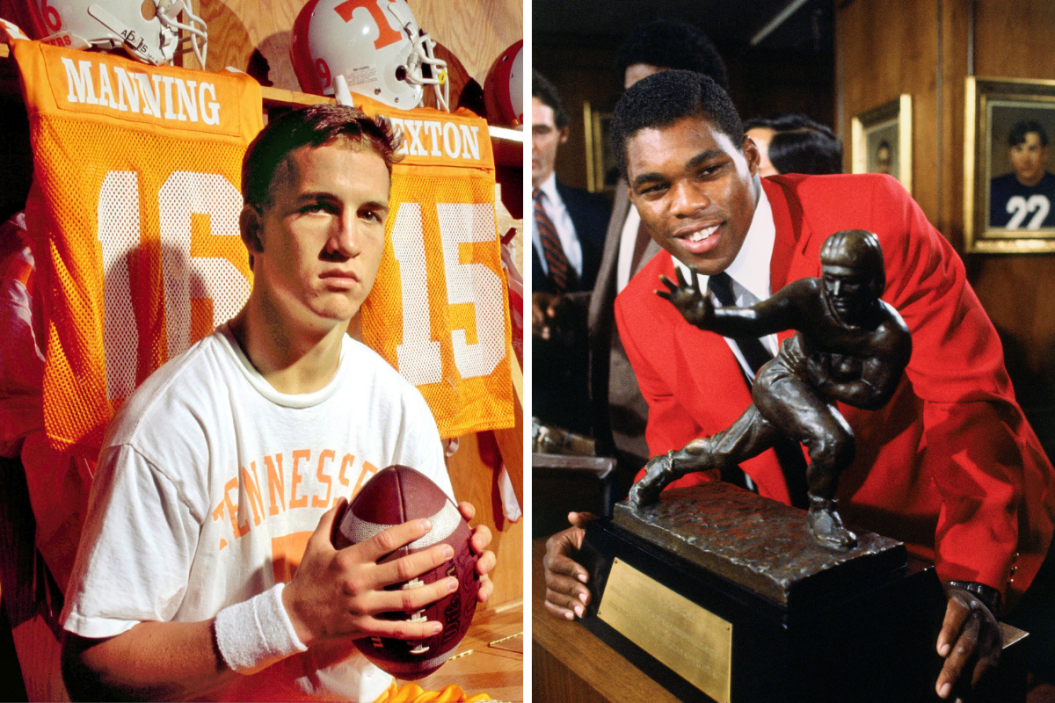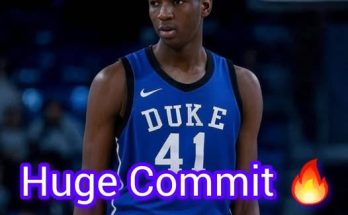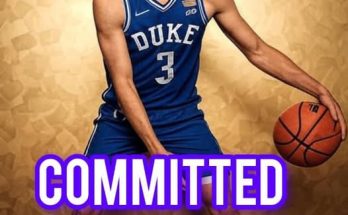In a groundbreaking announcement, ESPN declared that Texas Longhorns’ legendary running back, Earl Campbell, has been named the Greatest of All Time (GOAT) in college football, surpassing some of the sport’s most iconic figures. Campbell, who dominated college football during the 1970s, was selected over a stellar group of players including Herschel Walker of Georgia, Tim Tebow of the Florida Gators, and Archie Griffin of Ohio State. This recognition solidifies Campbell’s status as not only one of the greatest players in the history of the University of Texas but also in the annals of college football itself.
A Historic Legacy: Earl Campbell’s College Career
Born in Tyler, Texas, Earl Campbell’s rise to prominence was nothing short of extraordinary. He became a national sensation as the centerpiece of the Texas Longhorns’ offense, carving out a legacy that remains unrivaled to this day. From 1974 to 1977, Campbell took college football by storm, rushing for over 4,000 yards and scoring 40 touchdowns. His blend of size, strength, and speed was unmatched, and his ferocious running style earned him the nickname “The Tyler Rose.”
Campbell’s college career reached its zenith in 1977 when he won the prestigious Heisman Trophy as the best player in college football. He was a unanimous selection, marking him as one of the most dominant forces the sport had ever seen. That season alone, Campbell rushed for 1,744 yards and 19 touchdowns, leading the Longhorns to a victory in the Southwest Conference and a place in the Cotton Bowl.
What set Campbell apart from his peers was his ability to perform in the biggest moments. Whether it was running through defenders or breaking tackles with an almost supernatural ability, Campbell was a game-changer. His physicality, combined with his explosive speed, made him nearly impossible to stop. College football had never seen a running back with such a combination of size, power, and finesse, and his success in Austin cemented his place in the history books.
The Competition: Herschel Walker, Tim Tebow, and Archie Griffin
Earl Campbell’s reign as the greatest of all time in college football is remarkable, considering the storied careers of his competition. Three other college football legends — Herschel Walker, Tim Tebow, and Archie Griffin — were also in the running for the title of GOAT, and their accomplishments are legendary in their own right.
Herschel Walker – Georgia Bulldogs (1980-1982)
Herschel Walker is often mentioned in the same breath as the all-time greats in college football, and for good reason. The Georgia Bulldog’s career was one of consistent excellence, beginning in his freshman year when he led Georgia to a national championship in 1980. Over the course of his career, Walker accumulated 5,259 rushing yards and 49 touchdowns, setting records that stood for decades.
Walker’s physicality and speed made him a true nightmare for opposing defenses. He was known for his ability to dominate both on the ground and in the air, catching passes out of the backfield to further exploit defenses. Walker won the 1982 Heisman Trophy and was a two-time All-American, leaving a legacy that extended beyond his collegiate days. His success at Georgia is a key part of the Bulldogs’ storied football history, and his inclusion in the GOAT conversation is well-deserved.
Tim Tebow – Florida Gators (2006-2009)
Tim Tebow’s career at Florida was transformative, both on and off the field. A dual-threat quarterback, Tebow was one of the most unique players in college football history, winning the Heisman Trophy in 2007 as the first sophomore to do so. His career stats include 9,286 passing yards, 88 touchdowns, and 3,869 rushing yards, making him one of the most prolific offensive players in college football history.
Tebow led the Gators to two national championships (2006 and 2008) and was a three-time SEC Champion. Known for his leadership, toughness, and unyielding work ethic, Tebow became the face of college football in the late 2000s. His impact on the field was undeniable, and his ability to perform in clutch moments — including his iconic 2008 Sugar Bowl performance and his final season in 2009 — solidified his place among the sport’s elite.
While Tebow’s combination of passing and running made him one of the most complete quarterbacks to ever play in college, many consider him to be the quintessential “winner.” His ability to elevate his team and lead them to victory in the toughest of situations added to his GOAT credentials.
Archie Griffin – Ohio State Buckeyes (1972-1975)
Archie Griffin’s legendary college career at Ohio State stands as the pinnacle of individual achievement. A two-time Heisman Trophy winner (1974 and 1975), Griffin remains the only player in history to win the prestigious award twice. His incredible consistency and ability to perform at the highest level set him apart during his time at Ohio State.
Over his career, Griffin rushed for 5,589 yards, which, at the time, was an Ohio State record. He was a four-time Big Ten Champion, and his leadership on and off the field helped Ohio State maintain its dominance in college football during the 1970s. Griffin’s performances in the Rose Bowl and other major bowl games cemented his legacy as one of the most significant running backs in the history of the sport.
Why Earl Campbell Is the GOAT
Though the aforementioned legends — Herschel Walker, Tim Tebow, and Archie Griffin — were all formidable candidates for the title of greatest of all time, Earl Campbell’s impact on college football is unmatched. The argument in favor of Campbell being the GOAT is multifaceted, encompassing his combination of dominance on the field, his transformative influence on the running back position, and his role in Texas football’s prominence.
1. Unmatched Dominance
Earl Campbell’s combination of power, speed, and vision made him nearly unstoppable. His performance against top-tier defenses throughout his career was nothing short of dominant, and his ability to break tackles and create explosive plays is one of the reasons he was so revered. The “Tyler Rose” was a physical specimen, and his play on the field redefined the running back position. His 1977 season, in which he won the Heisman Trophy, remains one of the most dominant individual seasons in college football history.
2. Cultural Impact
Campbell wasn’t just a football player; he became a cultural icon. His style of play and ability to carry the Texas Longhorns to national prominence resonated with fans nationwide, especially in the state of Texas. His impact was felt beyond just the game of football — he became a symbol of toughness, resilience, and pride for the Longhorns and for Texas sports as a whole.
3. Transforming the Position
While Herschel Walker, Archie Griffin, and Tim Tebow were all elite players, Campbell’s impact on the running back position is something that shaped generations of future players. His combination of size and speed set a new standard for what a running back could achieve in college football, influencing how future athletes would train and play the position. He became a model for future generations of runners, including modern NFL greats who would look to Campbell as a source of inspiration.
4. Historical Context
While Herschel Walker and Archie Griffin had incredible careers, Campbell’s success came at a time when college football was undergoing major changes. The rise of televised games and the expansion of college football’s national reach allowed Campbell to solidify his place in history as one of the faces of the sport. His national exposure, combined with his undeniable talent, made him a household name during his playing days and has ensured his place as the GOAT even decades later.
Earl Campbell’s Legacy
Earl Campbell’s recognition as the Greatest of All Time in college football by ESPN is a fitting tribute to a player who not only defined an era but also left an indelible mark on the sport. His dominance on the field, his influence on future generations, and his place in the cultural history of college football make him a legend whose legacy will never be forgotten.
While players like Herschel Walker, Tim Tebow, and Archie Griffin will always have their place in the conversation about the greatest to ever play the game, Earl Campbell’s place at the top is unquestioned. As the “Tyler Rose” continues to be celebrated for his unparalleled contributions to the game, college football fans everywhere can agree on one thing: Earl Campbell is, without a doubt, the Greatest of All Time.



